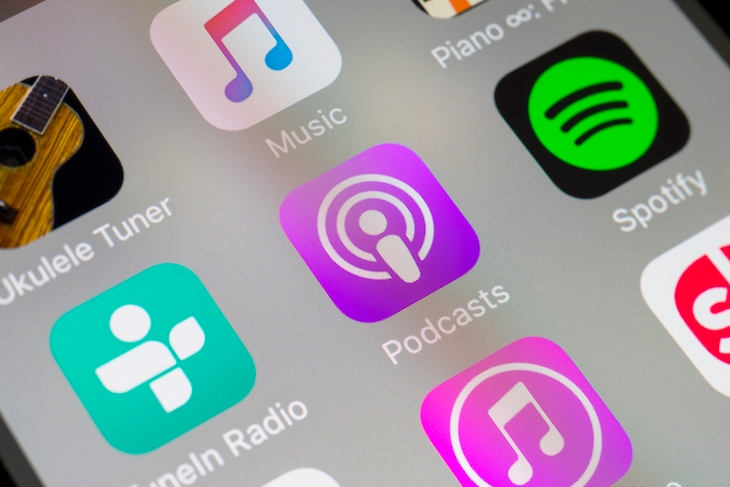‘Do you ever imagine your audience?’ was a question thrown at James Ward, creator and presenter of The Boring Talks podcast, at a recent seminar on podcasting organised by the BBC. ‘I try not to,’ Ward replied.‘I wouldn’t want to meet them.’
Such antipathy is all part of Ward’s alternative persona. The Boring Talks’s USP is to explore those topics usually considered too dull to explore, let alone talk about for half an hour. It’s become very popular, emerging from the Boring Talks conferences that have been held annually now for eight years. But his comment was very revealing. You can really tell when listening to his show that he doesn’t care about us. There’s no real effort to draw us in or convince us that the subject (be it wooden pallets, double-yellow lines or Bekonscot Model Village) is worth spending time with.
He’s not alone. A lot of podcasts are basically just a group of people chatting together with very little attention paid to those who might be listening. It’s as if we’re not there but are just eavesdropping, like being in a café or on the bus, except that if we were in a café or on a bus there would be the added frisson of trying not to look as though we’re listening, of only catching every other word and having to make up the rest of the conversation ourselves. Even with a relatively sophisticated podcast such as GrownUpLand (part of the BBC’s new stable of audio content prepared for podcast output only) after about 15 minutes it’s as if the presenters, Mae Martin, Bisha K. Ali and Ned Sedgwick, have forgotten we’re still out there, wanting but failing to get any attention.
Their podcast is a clever conceit on the Reithian mantra, twentysomethings looking to ‘the grown-up world’ of Radio 4 for advice on how to navigate through to their thirties and beyond. They’re articulate and are willing to do the research (using clips from the Radio 4 archive, such as Thinking Aloud and Lyse Doucet talking to the first elected female head of state in Africa, plus Sedgwick’s own interview with an inspiring activist from Ukraine). But without a proper structure the pace flags and their failure to engage with us means that no real connection is made.
Perhaps ironically the first-ever BBC podcast, almost 15 years ago, was In Our Time with Melvyn Bragg, back in the days when a BBC podcast simply meant a programme that could be listened to again long after the 30-day cut-off point on iPlayer. How much things have changed since then. Now amid the growing number of BBC podcasts (and soon to become even bigger with the appointment of a specialist podcast commissioner, Jason Phipps) there’s No Country for Young Women, whichI really wanted to like. The presenters, Sadia Azmat and Monty Onanuga, are sparky, different, challenging. Their remit is to talk about those issues which might connect with someone who’s ‘lost a part of where you’re from to fit in with where you are’. As Azmat says: ‘I mute my Indian vibe’ to get along here in Britain. But they’re young and still believe that to talk about sex ‘in great detail’ (so much so that I had to tick all the parental controls buttons to get on to the site) is radical.
So big now is the podcast audience (recent figures suggest that six million adults and rising are regular listeners to podcasts in the UK, mostly on their smartphones via headphones) that the BBC knows it needs to get up to speed (in comparison Radio 3 has a weekly reach of two million listeners, and Radio 4 just under 11 million). Those who are switching on to audio content are much younger than the average age of listeners to the BBC, mostly under-35, and they’re not combining their addiction to podcasts with listening to conventional BBC stations.
‘We’re in a moment now of reinvention for radio,’ says Phipps. Or perhaps a crisis for the BBC, which needs to start sprinting if it’s to catch up with the new audio upstarts. Podcasts are more intimate, more flexible, tell different stories, and can reach out to new audiences. They can ‘reinvent’ people, Phipps argues. ‘People sound different… outside the linear, claustrophobic studio atmosphere.’ All of which is true. You only have to listen to Ed Miliband on Reasons to be Cheerful or Laura Kuenssberg on Brexitcast. Phipps and co. also believe that the chance to control what you’re listening to, organise it, collect it, only choose what you know you’re interested in, is both revolutionary and hugely advantageous. That’s one way of looking at it.
But here’s another. If we get to the point where everything is listened to via podcast or pre-downloaded content, where all you hear is predicated on what you think you know you want to hear, what happens to broadening the mind, opening up one’s experience, hearing about something or someone you never thought you could possibly be interested in? And how does that play out at a time when politics, ideas, social groups are becoming ever more splintered, specialised and segregated?






Comments